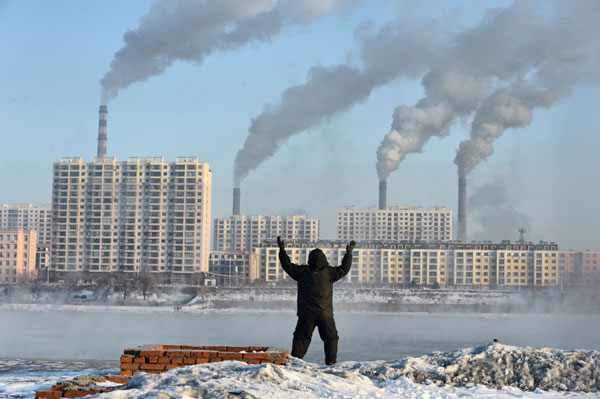13 agencies will be qualified to seek court action if amendment is passed
|
 |
|
An elderly man exercises on the side of Songhua River in the heavily polluted city of Jilin, Jilin province, on Feb 24. Heng Guoliang / For China Daily |
A proposed draft amendment to the Environmental Protection Law would make it easier for agencies to file public interest lawsuits against polluters.
Environment agencies that have registered with the Ministry of Civil Affairs for five years running and are deemed to have a good reputation will be able to file lawsuits against polluters.
The amendment, if it is approved, would be a major change to the law. Previously, only the All-China Environmental Federation was allowed to file public interest lawsuits. According to the National People's Congress Standing Committee, 13 agencies are thus far qualified to file a lawsuit if the amendment became law.
The amendment could be addressing concerns that the federation may not be capable of filing lawsuits across the country because of its limited human and financial resources.
Zhou Ke, an environmental protection law professor at Renmin University of China, said there is a lot of controversy surrounding the new drafts to the environment law, the third thus far — a fourth draft is expected sometime this week. But among the draft amendments, this stipulation that determines who is qualified to file a lawsuit against polluters is the most contentious.
The federation is a State-supported nonprofit organization considered by many legal experts the most capable environment agency, if not the only one, to file public interest lawsuits.
The second draft amendment to the Environmental Protection Law proposed that the All-China Environmental Federation and other local environment federations are qualified to file lawsuits, but many legal experts have interpreted the second draft to mean that only the All-China Environmental Federation has been sanctioned.
Although the third draft amendment on Monday has expanded the number of accepted environment agencies, experts said it will still be difficult for those agencies to meet the amendment’s requirements.
The requirement of "more than five years" may be very hard to reach for many organizations because registration procedures have been open to most organizations nationwide for less than two years, said Yang Sujuan, deputy head of the Environmental and Natural Resources Law Research Institute at the China University of Political Science and Law.
Yang said that limiting the number of qualified organizations is understandable given that the law is conservative. But she has concerns about the criterion that an environment agency must have a "good reputation" and said it is unclear as to what a good reputation is and which organization is entitled to give this accreditation.
Another legal expert, however, said the third version actually set more restrictions to the number of accepted plaintiffs, reducing the number of qualified organizations.
Based on a reading of the second draft amendment, at least 30 organizations might have been qualified if all provinces, municipalities and autonomous regions established their own environment federations, according to an expert who asked not to be named.
"But the new requirement has shut the door on environmental public interest litigation for all local organizations, including local environmental federations that were deemed qualified in the second draft," he said.
Contact the writers at zhaoyinan@chinadaily.com.cn and wuwencong@chinadaily.com.cn
